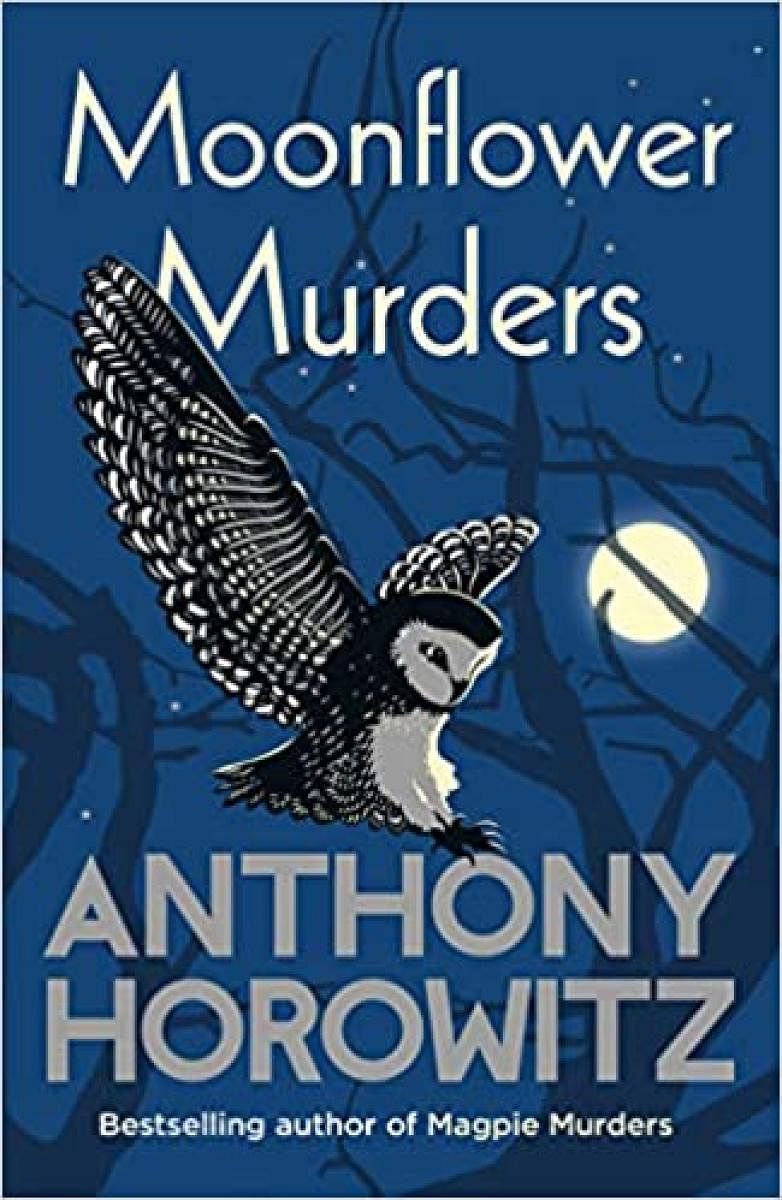
Moonflower Murders by Anthony Horowitz is the second book featuring Susan Ryeland, editor and reluctant sleuth, following the Magpie Murders. This one though is not directly a sequel and while it does feature the same protagonist, it stands well enough on its own.
In Moonflower Murders, a certain bestselling author (who also happens to be deceased) has written a book. It is a remarkable book, because it features a hotel and reflections of real personages who are, understandably, very annoyed. The author of the in-book book, Alan Conway, was rather infamous when he was alive and obnoxious to boot. He was also clever, placing clues to a murder within the pages of his book as Easter eggs.
Susan Ryeland, who was once editor of the infamous Conway’s books, is now a hotel owner. The hotel is doing badly. She has issues with her relationship. And then, strangely, she is approached by the forbidding Trehearnes, who offer her a vast sum of money to find their missing daughter Cecily.
The Trehearnes, who also own a hotel, had had a murder on their property eight years ago that Alan Conway had drafted into his novel. He had also apparently sprinkled clues throughout the text that only the hapless Cecily had spotted.
Then she was gone. Before the mystery was solved, naturally.
Unravelling the clues in Conway’s novel is far, far more difficult than Ryland had anticipated it to be. For one, the man was cryptic and blatantly obvious at the same time. Nothing is as it should be. Ryeland flies to London, speaks to people, angers them and is frequently lied to. The Trehearnes grow impatient. Cecily’s sister is waiting for a chance to dismiss Ryeland.
Moonflower Murders also features a book within the book, the novelist Conway’s detective story.
The one that apparently led Cecily to the conclusion that she knew who had murdered whom in her hotel eight years ago. It had been her wedding day as well.
This novel does feature a lot of characters and events and a great deal of sleuthing. It is fast paced and Ryeland often finds herself at a dead end — and is almost killed. The mysterious Alan Conway is already dead, but the character’s presence is strong throughout the book, through conversations and recollections and his book itself. There is suspense and drama and a mystery.
Susan Ryeland is a conflicted, complex character. The failings of her hotel in Crete weigh down on her, as does her relationship that seems tame to her to the point of boredom. Nobody can stand her, it seems, or her snooping around. People ask her to get out of their premises fairly frequently. Her memories of Alan Conway are often laced with frustration, for the man usually dismissed her editorial wisdom when she suggested changes to his novel. She has few close friends, many acquaintances who are rarely helpful and an employer in the Trehearnes who aren’t really patient with her.
Shades of Christie
There are shades of Agatha Christie in Moonflower Murders. Mysteries pile up. Time keeps running out, for the longer her investigation takes, the less are Ryeland’s chances of finding Cecily Trehearne. Every other individual seems to be warning her to shut up and leave. Not a very conducive environment for any sleuthing.
And the book within the book is a read in itself. Cleanly written, engrossing and reminiscent of an old-school detective story. It features enough intrigue and suspense even on its own, although you are introduced to a whole new cast of characters, including a charmingly sharp detective named Atticus Pund. The book within the book has its own style, its own setting, and a very interesting look at the life of an actress.
As for the dénouement, it happens dramatically. Maybe the build-up was a bit unlikely, because there were too many threads and too many people.
Of course, everybody is conflicted in Moonflower Murders. There are dark secrets almost everywhere and the book is an interesting study in psychology with its diverse range of characters. Personal resentments and frustrations abound. Nobody is truly happy. Everybody has shadows in their souls. It is a peculiar and cynical take on the state of society today, where even a happy, stable relationship is nowhere close to what it is projected to be.
The novel moves quickly and is full of twists and turns and there is, in spite of its modern setting and the occasional swearing, something old-worldly about it. Something that hearkens to the detective tales of the fifties.
Which is a period the novelist within the novel, Alan Conway, preferred too, for a good many reasons.
Overall, this is an entertaining and clever novel where the two whodunits skilfully come together.